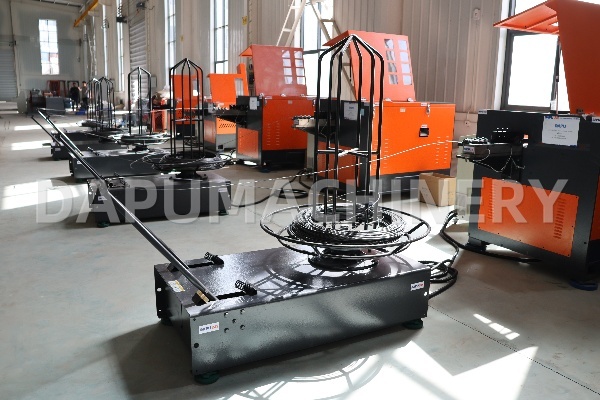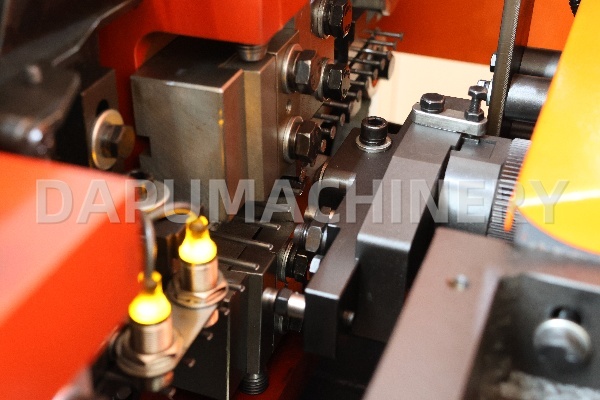
Top 5 Nail Making Machines for High-Speed Production in 2024
Category:News
Author:
Source:
Add time:2025-05-07 12:00
In fast-growing markets like South America, the Middle East, Southeast Asia, and Africa, construction and manufacturing sectors are booming. For businesses in these regions, investing in a high-speed nail making machine is crucial to meet rising demand for nails in roofing, furniture, and infrastructure projects. However, challenges like unstable power, harsh climates, and limited technical expertise make choosing the right machine a tough decision.
To simplify your search, we’ve curated a list of the top 5 nail making machines in 2024, focusing on speed, durability, and adaptability to emerging market needs. Leading the pack is the DAPU Nail Making Machine, a standout choice for its reliability and innovation.



1. DAPU Automatic Nail Making Machine
Best for: Versatility, Low Maintenance, and Emerging Markets
Model Highlight: DAPU Automatic Nail Making Machine
Why It Tops the List:
DAPU’s machine is engineered for high-speed production while addressing critical pain points in regions like Africa and Southeast Asia. Its robust design and adaptability make it a favorite for small workshops and large factories alike.
Key Features:
Speed: 200–400 nails per minute (adjustable based on nail size).
Power Efficiency: Runs on 7.5 kW, compatible with generators or solar setups for off-grid areas.
Material Flexibility: Works with wire diameters from 1.2mm to 5.0mm, including recycled steel—ideal for cost-sensitive markets.
Durability: Reinforced steel frame and anti-rust coatings withstand humidity (common in tropical climates) and dusty environments.
Ease of Use: Intuitive touchscreen controls and automatic error detection reduce downtime and training costs.
Technical Specs:
Nail Length: 10mm–150mm
Weight: 1,500 kg
Dimensions: 1500mm x 900mm x 1500mm
Ideal For:
South America: Affordable housing projects requiring bulk common nails.
Middle East: High-temperature regions needing corrosion-resistant machines.
Africa: Solar-powered rural workshops with limited grid access.
2. TurboNail Pro-X3
Best for: Ultra-High Output (Large Factories)
Key Features:
Speed: 500–600 nails per minute.
Heavy-Duty Build: Designed for 24/7 operation.
Drawback: High power consumption (15 kW) makes it less suitable for areas with unstable electricity.
Why It Fits Emerging Markets?
While powerful, the Pro-X3 requires stable 3-phase power, limiting its use in regions like rural Africa. However, it’s a strong choice for urban industrial zones in Southeast Asia or the Middle East with reliable infrastructure.
3. EcoNail Master
Best for: Eco-Friendly Production
Key Features:
Solar-Ready: Compatible with hybrid solar/grid power systems.
Low Noise: Ideal for urban workshops in crowded cities.
Speed: 150–250 nails per minute.
Why It Fits Emerging Markets?
EcoNail’s energy-saving design suits regions like Sub-Saharan Africa or remote South American villages prioritizing sustainability. However, its slower speed may not meet high-volume demands.
4. SteelCraft Compact 2024
Best for: Small Workshops & Startups
Key Features:
Affordable Price: 30% cheaper than industrial-grade machines.
Portable Design: Lightweight (800 kg) for easy relocation.
Speed: 100–180 nails per minute.
Why It Fits Emerging Markets?
Perfect for startups in Southeast Asia or Africa with tight budgets. However, its lower output and manual adjustments may not suit large-scale projects.
5. PowerDrive Industrial
Best for: Specialty Nails (Roofing, Concrete)
Key Features:
Customization: Swappable molds for unique nail designs.
Speed: 300–400 nails per minute.
Drawback: Complex setup requires skilled operators.
Why It Fits Emerging Markets?
Useful for Middle Eastern manufacturers producing corrosion-resistant roofing nails. However, the need for technical expertise may be a barrier in regions with labor skill gaps.
Comparison Table
| Feature | DAPU Automatic | TurboNail Pro-X3 | EcoNail Master | SteelCraft Compact | PowerDrive Industrial |
|---|---|---|---|---|---|
| Speed (nails/min) | 200–400 | 500–600 | 150–250 | 100–180 | 300–400 |
| Power Consumption | 7.5 kW | 15 kW | 5 kW | 4 kW | 10 kW |
| Material Flexibility | 1.2mm–5.0mm | 2.0mm–5.0mm | 1.5mm–4.5mm | 1.0mm–3.5mm | 2.5mm–6.0mm |
| Ideal Market | All regions | Urban industrial zones | Off-grid/rural areas | Small startups | Specialty nail makers |
| Price Range | $$$ | $$$$$ | $$ | $ | $$$$ |
Critical Factors for Emerging Markets
When selecting a nail making machine for regions like Africa or Southeast Asia, prioritize these features:
Power Adaptability: Machines like the DAPU or EcoNail work with solar/generator setups, avoiding grid dependency.
Low Maintenance: Dust-resistant components and simple designs reduce repair costs in harsh environments.
Training Support: Opt for brands offering local-language manuals or onsite training (e.g., DAPU provides video guides).
Cost vs. Speed Balance: High-speed machines may seem attractive, but consider electricity costs and ROI timelines.
Why DAPU Stands Out in 2024
While all five machines have strengths, the DAPU Automatic Nail Making Machine offers the best balance for high-speed production in challenging environments:
Proven in Harsh Climates: Used in Nigerian roofing factories and Indonesian rural cooperatives.
Scalable Output: Adjust speed to match demand spikes during construction seasons.
Localized Support: DAPU partners with regional distributors for spare parts and repairs.
Conclusion
Choosing the right nail making machine in 2024 depends on your location, budget, and production goals. For most businesses in emerging markets, the DAPU Automatic Nail Making Machine remains the top recommendation due to its adaptability, durability, and cost-efficiency. Whether you’re a startup in Vietnam or a growing factory in Brazil, investing in the right equipment ensures you stay competitive in the booming construction sector.
Ready to explore high-speed nail production? Visit DAPU Machinery to learn more about their 2024 models and tailored solutions for your region.
Recommend News




